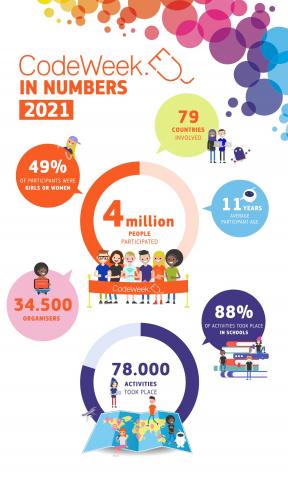
EU Code Week
In a mix of virtual and in-person events, teachers, educators, organisations and coding enthusiasts registered a record-breaking 78,000 Code Week activities in 2021. Despite the challenges that schools were facing, 4 million people from 79 countries joined the initiative that aims to bring coding and computational thinking to everyone. The 10th edition will take place from 8-23 October 2022.
As a grass-roots movement, Code Week was set up with the aim of showing young people and adults how ideas can be brought to life through coding and to help them better understand how digital technologies affect society and their lives. Code Week aims to demystify programming and bring motivated people together to learn. It celebrates creativity, problem solving and collaboration through programming and other tech activities, and has reached over 15.5 million people around the globe in the last five years. In the 2013 edition of Code Week, 3,000 activities took place with 10,000 participants which shows the increase in Code Week’s popularity.
Teachers at the heart of Code Week’s success
With the help of Code Week, teachers are easily able to include coding activities in their classes to inspire their students, to learn new skills and empower them to use technology to solve real-life problems. 88% of activities in 2021 took place in schools with the average participant age being 11 years. 49% of participants were girls or women.
The most popular themes were playful coding activities, as well as coding activities without computers and basic programming concepts. The most popular activities with advanced technologies were game design, data manipulation and augmented reality. More detailed stats and results of the 2021 edition are in the dedicated blog post.
Teachers are also active learners and eager to bring innovative teaching approaches to their classrooms. Since 2019, more than 20,000 teachers have taken part in different Code Week training courses. In 2021, EU Code Week offered a Massive Open Online Course (MOOC) on AI basics for schools as well as the Code Week Bootcamp MOOC, which provided teachers of all subjects from pre-primary to secondary with resources, concrete lesson plans and tools on how to inspire students to learn to code.
10 countries with more than 1,000 activities
In 2021, Turkey (27,000), Italy (18,000) and Poland (15,000) hosted most activities in absolute numbers. Other active countries were Greece (2,300 activities), Austria and Romania (both 1,800), Hungary (1,400), Croatia, Germany and Spain (all 1,000). When it comes to the amount of organised activities per capita, the three leading countries of 2021 were Monaco, Malta and Estonia.
Code Week 4 All
In the Code Week 4 All Challenge, activity organisers connect to exchange experiences and form alliances. In 2021, 3,600 alliances were formed. 800 fulfilled the conditions of the challenge (at least 10 activities or 3 countries linked) and their members will receive the Certificate of Excellence from Code Week
Code Week podcasts about digital technologies and education
In 2021, EU Code Week rolled-out the biggest variety of trainings, resources, materials and engagement opportunities in its history including a virtual kick-off event with inspirational speakers, 18 brand new coding Challenges, a series of hackathons or a new podcast about coding, digital technologies and education.
Code Week celebrates 10 years 8-23 October 2022
In 2022, the community is preparing for Code Week’s 10th anniversary, 8-23 October. The first possibility to get involved is to participate in the Cake challenge, practicing computational thinking by baking a birthday cake for Code Week. To mark the first decade, more record-breaking activities and challenges will be launched soon.
About EU Code Week
EU Code Week, is a grass-roots initiative supported by the European Commission, which aims to bring coding and digital literacy to everyone in a fun and engaging way with activities organised around the world by teachers and coding enthusiasts. It contributes to the EU’s Digital decade targets whereby 80% of the EU’s population will have digital skills.

